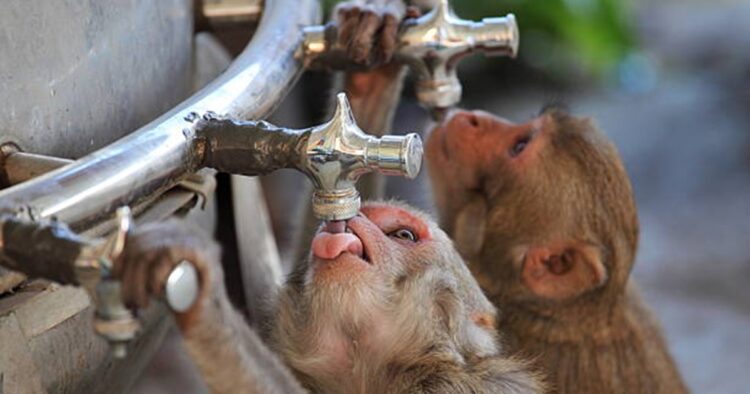As the summer heat intensifies and water becomes scarce in Bengaluru, monkeys are facing a tough time finding food and shelter. With the city’s green cover diminishing due to the construction of high-rise buildings, these animals are forced to seek refuge in residential areas, often entering homes in search of sustenance. The Bruhat Bengaluru Mahanagara Palike (BBMP) has been inundated with complaints from residents about monkeys invading their living spaces, snatching food, and even resorting to attacks.
According to senior officials from the Karnataka Forest Department and BBMP, the root cause of this issue lies in the rapid urbanization of Bengaluru, which has led to the destruction of the monkeys’ natural habitat. Once abundant with trees and orchards, the city now resembles a concrete jungle, leaving the primates with no choice but to venture into human settlements in search of food and water.
Ravindra Kumar N, Deputy Conservator of Forests, Bengaluru Urban, highlighted that the monkeys, like other domesticated animals, are loyal creatures. Even if relocated to forests, they tend to return to places where they found sustenance. He emphasized the seriousness of the situation, pointing out that monkeys can be aggressive and pose a risk to residents, especially children.
In response to the escalating conflict, the BBMP has set up a helpline (1526) for residents to report monkey-related issues. However, Deputy Conservator of Forests at BBMP, BLG Swamy, stressed the importance of proactive measures by residents. He advised against irregular and unscientific feeding of monkeys, which only exacerbates the problem by encouraging them to enter homes in search of food.
To address the monkey menace, residents are urged to take preventive measures at the apartment level. This includes deploying security personnel to deter monkeys and avoiding feeding them irregularly. Additionally, the BBMP has an animal rescue team to handle situations where monkeys pose a threat to residents’ safety.
Various solutions have been proposed, such as setting up solar-powered fences and placing stuffed animal toys to scare monkeys away. Additionally, the idea of employing langurs, similar to what was done in Delhi near the Parliament, has been suggested as a potential deterrent.
Despite the challenges, residents are taking action to protect themselves from monkey intrusions. Some have issued notices prohibiting feeding monkeys and warned of fines for those found violating the rule. Nonetheless, encounters with monkeys remain a concern for residents, with reports of monkeys entering homes and causing damage to property.
As Bengaluru grapples with water scarcity and urban expansion, finding a sustainable solution to the monkey menace remains a pressing issue for authorities and residents alike. Vigilance and cooperation are essential to mitigate conflicts and ensure the safety of both humans and wildlife in the city.

















Comments